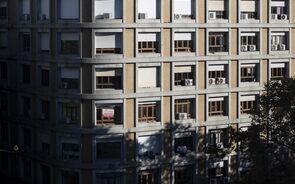PM of Latvia: I am not complaining
2 mensagens
|Página 1 de 1
Re: PM of Latvia: I am not complaining
Pata-Hari Escreveu:http://www.nytimes.com/2011/03/09/world/europe/09latvia.html?_r=1European Union Salaries a Haven for Eastern Europeans
By STEPHEN CASTLE
Published: March 8, 2011
Share
BRUSSELS — As prime minister of Latvia, Valdis Dombrovskis has one of the worst jobs in politics: cutting jobs and slashing salaries in an effort to strengthen his nation’s depleted finances.
Rupert Hartley/Bloomberg News
Valdis Dombrovskis, Latvia's prime minister, earns far less than Latvians in Brussels.
For his trouble he receives a pretax salary of about $45,000 a year, buys his own health insurance and lives in a three-room, Soviet-built apartment.
But while Mr. Dombrovskis earns less than many police officers walking beats in Western Europe, other Latvian officials do not do so badly.
Take Andris Piebalgs, Latvia’s member of the European Commission. He earns $345,000 a year, almost eight times as much as Mr. Dombrovskis. Egil Levits, Latvia’s judge at the European Court of Justice, gets the same amount, which means he earns about $100,000 more than the chief justice of the United States Supreme Court. The benefits are not bad, either: a housing and living allowance, a stipend of about $6,000 annually per dependent child, around $10,000 a year for entertainment and a generous pension with no employee contribution.
Professional interests and talents aside, it’s easy to see why there has been a white-collar gold rush from struggling Eastern European countries to employment with the European Union.
Since mid-2004, when the first of two sets of new, mainly ex-Communist, countries joined the bloc, more than 4,700 Eastern Europeans have come to work for the European Commission, the union’s executive branch. From countries like Poland, Lithuania, Bulgaria and Estonia, they now represent around one-sixth of the commission’s work force, easily exceeding a quota the commission set itself to integrate the new nations.
For example, nearly 150 Latvians work for the commission as administrators, earning at least 50 percent more than Mr. Dombrovskis. And 288 Romanians are on the entry-level rung of administrators — more than the number of Germans, French and Britons combined.
While governments across the 27-nation bloc are mired in austerity measures, with several slashing civil service pay, Brussels salaries have remained immune. That has led to a familiar criticism that the union’s officials are detached from the economic struggles that have befallen the Continent since the economic crisis began in 2008.
High salaries and the fact that officials got a small raise for this fiscal year are particular problems when Brussels is telling countries like Greece to cut spending and public sector jobs, said Jorge Nuñez Ferrer, an associate research fellow at the Center for European Policy Studies, a research institute in Brussels.
“It is symbolic of their remoteness,” he said. “When they are monitoring other countries, telling them what to do about their budget deficits, that they should rein in spending, cut their public sectors and reduce salaries, my reaction is, what about your salaries?”
The European Union has always struggled with how much to pay members of Parliament, bureaucrats, judges and other employees. Peg the salaries to the economies or pay structure in a person’s home country, and it means employees do the same work for extravagantly different compensation. Peg them to a Western European standard and you get what might be called the Dombrovskis effect.
According to Maros Sefcovic, the European Commission vice president responsible for administration and salaries, the pay is appropriate for international jobs, where top officials have to run households in two countries.
“The commission is definitely not higher-paying than the International Monetary Fund or the Organization for Economic Cooperation and Development,” he said, adding that the salaries are necessary to attract quality candidates.
The pay discrepancy is more noticeable in nations like Latvia, which thought joining the union would mean wages at home would rise to Western European levels. Now the financial crisis has pushed many countries in the opposite direction, forcing them to cut even the prime minister’s pay. Latvia cut the post’s compensation by 20 percent in 2009 and it has been frozen since then.
Mr. Dombrovskis, 39, who in 2009 gave up his seat in the European Parliament, where he would have been earning three times as much as he is now, seems philosophical. “Everything is relative,” he said of his salary. “It’s less than in the European Parliament or to compare with other prime ministers, but, to put this in a Latvian context, it’s not so small.”
But he added, “In nominal terms, I earn less now than in 2003 when I was finance minister.”
Normunds Popens, Latvia’s representative to the European Union, takes a similar view. “The financial crisis has brought pay cuts to many countries around the table, and not only new countries like Estonia, which cut first, and the Romanians,” he said. “Ireland cut salaries, as did Greece.”
Mr. Popens recently joined the commission as deputy director general for regional policy, a job whose pay is more than five times that of Mr. Dombrovskis. He says that while money is a factor in the move, the challenge of taking on a new job in a European institution is more important.
For his part, Mr. Dombrovskis says he has no prospect of a pay raise before next year at the earliest, but seems embarrassed when asked if he is paid enough.
“I’m not complaining, thank you,” he said.
Bons "jobs"....
Como estas pessoas podem pedir sacrifícios aos demais, se eles não os fazem e recebem muito acima das suas reais necessidades/capacidades?
- A ganância dos outros poderá gerar-lhe lucros.
- A sua ganância poderá levá-lo à ruína.
- A sua ganância poderá levá-lo à ruína.
PM of Latvia: I am not complaining
http://www.nytimes.com/2011/03/09/world ... .html?_r=1
European Union Salaries a Haven for Eastern Europeans
By STEPHEN CASTLE
Published: March 8, 2011
Share
BRUSSELS — As prime minister of Latvia, Valdis Dombrovskis has one of the worst jobs in politics: cutting jobs and slashing salaries in an effort to strengthen his nation’s depleted finances.
Rupert Hartley/Bloomberg News
Valdis Dombrovskis, Latvia's prime minister, earns far less than Latvians in Brussels.
For his trouble he receives a pretax salary of about $45,000 a year, buys his own health insurance and lives in a three-room, Soviet-built apartment.
But while Mr. Dombrovskis earns less than many police officers walking beats in Western Europe, other Latvian officials do not do so badly.
Take Andris Piebalgs, Latvia’s member of the European Commission. He earns $345,000 a year, almost eight times as much as Mr. Dombrovskis. Egil Levits, Latvia’s judge at the European Court of Justice, gets the same amount, which means he earns about $100,000 more than the chief justice of the United States Supreme Court. The benefits are not bad, either: a housing and living allowance, a stipend of about $6,000 annually per dependent child, around $10,000 a year for entertainment and a generous pension with no employee contribution.
Professional interests and talents aside, it’s easy to see why there has been a white-collar gold rush from struggling Eastern European countries to employment with the European Union.
Since mid-2004, when the first of two sets of new, mainly ex-Communist, countries joined the bloc, more than 4,700 Eastern Europeans have come to work for the European Commission, the union’s executive branch. From countries like Poland, Lithuania, Bulgaria and Estonia, they now represent around one-sixth of the commission’s work force, easily exceeding a quota the commission set itself to integrate the new nations.
For example, nearly 150 Latvians work for the commission as administrators, earning at least 50 percent more than Mr. Dombrovskis. And 288 Romanians are on the entry-level rung of administrators — more than the number of Germans, French and Britons combined.
While governments across the 27-nation bloc are mired in austerity measures, with several slashing civil service pay, Brussels salaries have remained immune. That has led to a familiar criticism that the union’s officials are detached from the economic struggles that have befallen the Continent since the economic crisis began in 2008.
High salaries and the fact that officials got a small raise for this fiscal year are particular problems when Brussels is telling countries like Greece to cut spending and public sector jobs, said Jorge Nuñez Ferrer, an associate research fellow at the Center for European Policy Studies, a research institute in Brussels.
“It is symbolic of their remoteness,” he said. “When they are monitoring other countries, telling them what to do about their budget deficits, that they should rein in spending, cut their public sectors and reduce salaries, my reaction is, what about your salaries?”
The European Union has always struggled with how much to pay members of Parliament, bureaucrats, judges and other employees. Peg the salaries to the economies or pay structure in a person’s home country, and it means employees do the same work for extravagantly different compensation. Peg them to a Western European standard and you get what might be called the Dombrovskis effect.
According to Maros Sefcovic, the European Commission vice president responsible for administration and salaries, the pay is appropriate for international jobs, where top officials have to run households in two countries.
“The commission is definitely not higher-paying than the International Monetary Fund or the Organization for Economic Cooperation and Development,” he said, adding that the salaries are necessary to attract quality candidates.
The pay discrepancy is more noticeable in nations like Latvia, which thought joining the union would mean wages at home would rise to Western European levels. Now the financial crisis has pushed many countries in the opposite direction, forcing them to cut even the prime minister’s pay. Latvia cut the post’s compensation by 20 percent in 2009 and it has been frozen since then.
Mr. Dombrovskis, 39, who in 2009 gave up his seat in the European Parliament, where he would have been earning three times as much as he is now, seems philosophical. “Everything is relative,” he said of his salary. “It’s less than in the European Parliament or to compare with other prime ministers, but, to put this in a Latvian context, it’s not so small.”
But he added, “In nominal terms, I earn less now than in 2003 when I was finance minister.”
Normunds Popens, Latvia’s representative to the European Union, takes a similar view. “The financial crisis has brought pay cuts to many countries around the table, and not only new countries like Estonia, which cut first, and the Romanians,” he said. “Ireland cut salaries, as did Greece.”
Mr. Popens recently joined the commission as deputy director general for regional policy, a job whose pay is more than five times that of Mr. Dombrovskis. He says that while money is a factor in the move, the challenge of taking on a new job in a European institution is more important.
For his part, Mr. Dombrovskis says he has no prospect of a pay raise before next year at the earliest, but seems embarrassed when asked if he is paid enough.
“I’m not complaining, thank you,” he said.
2 mensagens
|Página 1 de 1



